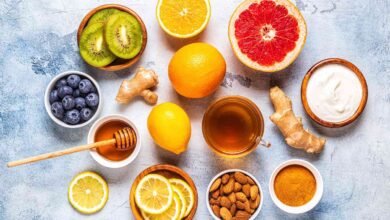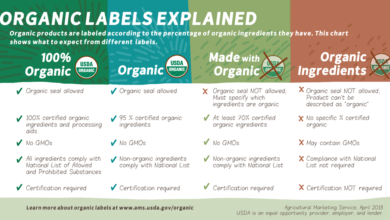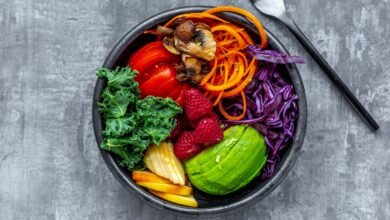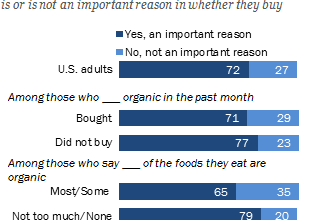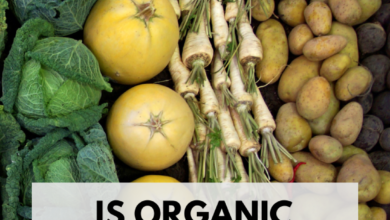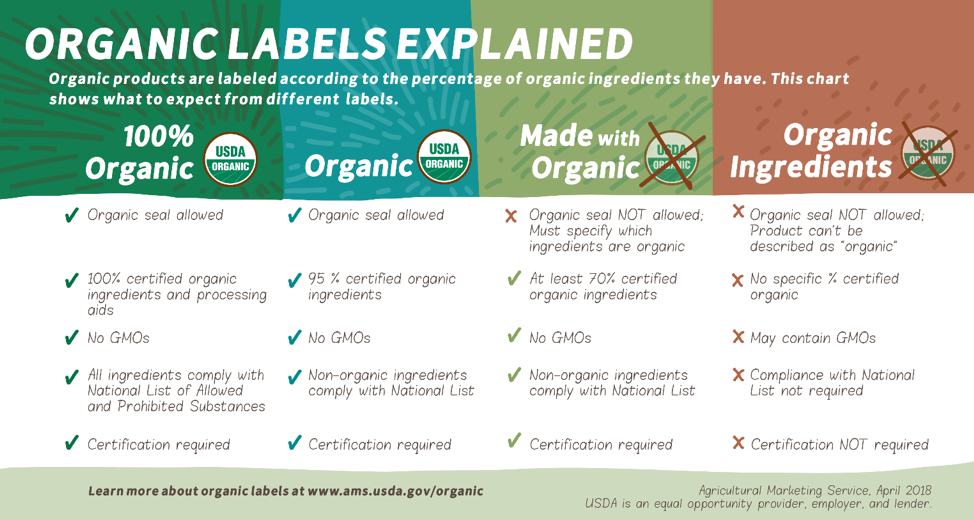
Does Eating Organic Make You Healthier
Yes, eating organic can make you healthier. Organic foods often contain fewer chemicals.
They may offer more nutrients. Organic foods are growing in popularity. Many people believe they are better for health. But what makes them different? Organic farming avoids synthetic pesticides and fertilizers. This means fewer harmful substances on your plate. Some studies suggest organic foods have more vitamins and minerals.
They might also have higher antioxidant levels. These are good for fighting disease. Eating organic can also reduce exposure to antibiotics and hormones found in conventional foods. This may lower health risks. But organic foods can be expensive. Are they worth the cost? Understanding the benefits can help you decide if they fit your lifestyle and budget. Let’s explore how organic choices impact your health.

Credit: shopnoble.com
Organic Food Basics
Organic food is gaining popularity for its perceived health benefits. Many wonder if eating organic can truly make you healthier. Understanding the basics of organic food is essential. This includes knowing what organic means and how organic farming works. This will help in making informed choices.
What Is Organic?
Organic refers to how food is grown and processed. Organic foods are produced without synthetic pesticides. They avoid using chemical fertilizers and genetically modified organisms. This type of food must meet specific standards. These standards are set by regulatory bodies.
Organic food often contains fewer additives. It focuses on natural processes. This may lead to a more nutrient-rich product. Many people choose organic food for its purity. They believe it offers better health benefits.
How Organic Farming Works
Organic farming emphasizes sustainable practices. It prioritizes soil health and biodiversity. Farmers use crop rotation to enrich the soil. They often plant cover crops to prevent erosion. Organic farming avoids synthetic chemicals. Instead, it relies on natural pesticides and fertilizers.
Livestock in organic farms have strict guidelines. Animals must have access to outdoor spaces. Organic farms promote humane treatment. These practices aim to produce healthier and safer food. By focusing on the environment, organic farming supports long-term health.
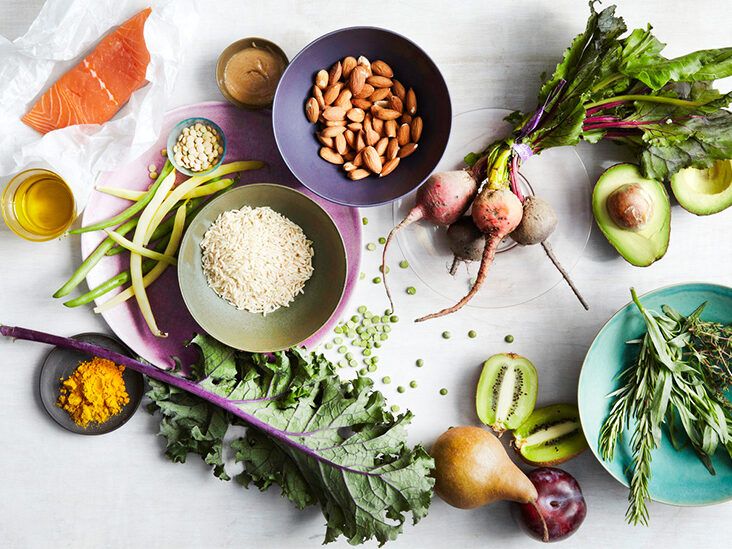
Credit: www.healthline.com
Nutritional Benefits
Eating organic foods may provide health benefits by reducing exposure to pesticides and synthetic additives. Organic produce often has higher levels of antioxidants and essential nutrients. These factors can contribute to a healthier lifestyle and improved overall well-being.
Eating organic foods is often linked to better health. Many claim these foods offer superior nutrition. But does choosing organic really boost your nutrient intake? Let’s explore the nutritional benefits of organic foods and see what science says.Higher Nutrient Levels?
Organic foods may contain more nutrients. Some studies show higher levels of vitamins and minerals. These include vitamin C, iron, and magnesium. The soil used in organic farming is often richer. This can lead to more nutrient-dense crops. But not all studies agree. Nutrient levels can vary by food type and farming methods.Antioxidant Properties
Organic foods might offer more antioxidants. Antioxidants fight harmful free radicals in the body. Organic plants often face more stress from pests. This stress can lead to increased antioxidant production. Foods like organic berries and spinach may have higher antioxidant levels. This could benefit your overall health. Yet, more research is needed to confirm these findings.Pesticide-free Advantages
Eating organic can enhance health by reducing exposure to harmful chemicals. Organic foods often contain higher nutrient levels. Choosing pesticide-free options supports a cleaner diet and healthier lifestyle.
Eating organic foods can offer several benefits. One of the key advantages is the absence of synthetic pesticides. These chemicals are used in conventional farming to protect crops from pests. Consuming food without these synthetic substances might lead to better health outcomes. Let’s explore why pesticide-free choices matter and how organic options can serve as a healthier alternative.Impact Of Pesticides
Pesticides help farmers grow more food. But they may have downsides. Some studies link pesticides to health issues. They might affect the nervous system. They can also disrupt hormones. Long-term exposure may increase health risks. People may unknowingly consume them through food. Even washing fruits and vegetables doesn’t remove all residues. Children and pregnant women are more vulnerable. Reducing pesticide intake may benefit overall health.Organic Alternatives
Organic farming avoids synthetic pesticides. It uses natural methods for pest control. This includes rotating crops and using natural predators. Organic produce often has fewer pesticide residues. Choosing organic can reduce your exposure to these chemicals. Organic foods may contain more nutrients. Some studies show higher antioxidant levels in organic crops. Buying organic supports sustainable farming practices. It promotes biodiversity and protects the environment. With organic options, you can enjoy food with peace of mind.Environmental Impact
Choosing organic foods isn’t just about personal health; it’s a vote for a healthier planet. While organic products have sparked debates over their nutritional benefits, their impact on the environment is undeniable. By opting for organic, you contribute to sustainable farming practices and support biodiversity, ensuring a better future for our planet.
Sustainable Practices
Organic farming uses methods that work with nature. It avoids synthetic pesticides and fertilizers, reducing pollution and conserving water. These practices keep harmful chemicals out of our soil and water, which benefits local ecosystems and communities. When you buy organic, you’re supporting farmers who prioritize the earth’s health.
Consider the food chain’s impact on carbon emissions. Organic farming often uses less energy and produces fewer greenhouse gases. This means each organic product you purchase helps lower your carbon footprint. It’s a small but meaningful way to contribute to global sustainability efforts.
Biodiversity Support
Organic farms are havens for biodiversity. They encourage a rich variety of plants and animals, which helps maintain healthy ecosystems. By avoiding harmful chemicals, organic farming provides safe habitats for beneficial insects, birds, and other wildlife. This balance supports natural pest control and soil fertility.
Think about the importance of crop rotation and mixed planting. These techniques, common in organic farming, enhance soil health and prevent disease outbreaks. It’s not just about growing food; it’s about nurturing an environment where nature thrives. Are you aware of how your food choices impact biodiversity in your community?
Every organic purchase is a step toward sustaining our planet’s natural resources. As you make daily food decisions, consider the environmental legacy you’re building. Are you ready to make a change that benefits both your health and the earth?
Health Implications
Eating organic has become increasingly popular as people look for ways to improve their health. But does choosing organic foods actually make you healthier? One key factor lies in understanding the health implications of consuming organic versus conventional produce. This exploration helps you make informed decisions about your diet and well-being.
Reducing Chemical Exposure
Organic foods are grown without synthetic pesticides and fertilizers. This means you consume fewer chemicals when you choose organic. Have you ever thought about the number of chemicals you might be ingesting with each bite of conventional produce?
Consider this: when you eat organic, you minimize your exposure to potentially harmful substances. For some, especially those with chemical sensitivities, this can lead to noticeable health improvements. A friend of mine switched to organic and noticed fewer headaches and skin irritations.
Is reducing chemical exposure worth the extra cost for you? Weigh the benefits against your budget and health priorities.
Potential Health Risks
While organic foods reduce chemical exposure, they’re not completely risk-free. Organic farms can still use natural pesticides, which may not always be harmless. How do these alternatives impact your health?
Additionally, organic foods might have a higher risk of contamination from bacteria due to less rigorous processing methods. This is something to consider, especially for those with compromised immune systems. Eating organic is beneficial, but knowing the potential risks helps you make balanced choices.
Are you prepared to handle these risks for the potential benefits? Evaluating both sides ensures a healthier lifestyle tailored to your needs.
Economic Factors
Organic foods often cost more than non-organic options, influencing purchasing decisions. Higher prices can limit accessibility for some individuals. Choosing organic may lead to healthier eating habits but economic factors play a significant role in decision-making.
Eating organic foods often seems like a healthier choice. But economic factors play a big role. Many people wonder if the higher cost of organic foods is worth it. Understanding these economic aspects helps in making informed decisions. Let’s dive deeper.Cost Of Organic Products
Organic products usually cost more than conventional ones. This higher price comes from several factors. Organic farming requires more manual labor. Farmers often face stricter regulations and need special certifications. These add to their costs. They use natural fertilizers and pest controls, which can be expensive. Limited supply and higher production costs also drive up prices. So, consumers pay more at the store.Market Demand
The demand for organic products has increased over the years. More people want healthier and environmentally friendly options. This rising demand affects market prices. As demand grows, stores stock more organic products. This competition can sometimes lower prices. But high demand often means prices stay high. Farmers and retailers notice this trend. They adjust their prices based on consumer interest.Consumer Perceptions
Many people wonder if organic food is healthier. Consumers often believe organic means better. This belief influences buying choices and grocery lists. But what shapes these perceptions? Let’s explore consumer thoughts on organic food.
Organic Food Trends
Organic food popularity is growing. More stores offer organic products now. Shelves display organic fruits, vegetables, and snacks. This trend aligns with health-conscious lifestyles. People want food free from chemicals and pesticides. Organic labels attract those seeking natural options.
Farmers’ markets also show this trend. Shoppers find local and organic options there. This supports small farms and local economies. Demand for organic food continues to rise. It reflects a shift in consumer priorities.
Public Opinions
People have varied opinions on organic foods. Some see it as healthier. They believe organic food offers more nutrients. Others feel it tastes better. These perceptions influence their buying habits.
Yet, some think organic is just a label. They question if it’s worth the extra cost. Price often affects their decision to buy organic. Public opinions shape the market for organic foods. They reflect a balance between health beliefs and budget concerns.

Credit: foodtank.com
Making Informed Choices
Making informed choices about organic food is essential for your health. With many options available, understanding labels and diet balance is key. Eating organic can impact your well-being, but smart decisions are crucial.
Reading Labels
Labels provide important information about food. They help you understand what’s inside. Organic labels mean the product meets strict standards. These standards often include no synthetic pesticides or fertilizers. Reading labels helps you avoid unwanted additives. It’s a simple step for better health. Look for certification marks. This ensures the product is truly organic. Knowing what you eat can make a difference.
Balancing Diet Options
Balance is vital in any diet. Organic foods can be part of a healthy lifestyle. But variety matters too. Include different food groups in your meals. This ensures you get all needed nutrients. Organic fruits and vegetables can be nutritious. But don’t forget whole grains and proteins. Mix conventional and organic if necessary. A balanced diet supports overall health. It’s about making the best choice for you.
Frequently Asked Questions
Is Eating Organic Actually Better For You?
Eating organic may reduce exposure to pesticides and chemicals. Organic foods often contain higher antioxidants. Nutrient differences are minimal, but some people prefer the taste. Organic farming is environmentally friendly. Personal health benefits are inconclusive. Choose based on preference and budget.
What Happens To Your Body If You Only Eat Organic Food?
Eating only organic food may reduce pesticide exposure and support better health. Organic produce might offer higher nutrient levels. Improved digestion can occur due to fewer additives. You may experience enhanced energy levels and better skin health, while supporting sustainable farming practices.
Is It Better To Eat Local Or Organic?
Eating local supports local farmers and reduces carbon footprint. Organic foods avoid harmful pesticides and chemicals. Prioritize local organic produce for maximum benefits. Choose based on availability, budget, and personal preference to maintain a balanced, healthy diet. Both options contribute positively to health and environmental sustainability.
What Are Some Disadvantages Of Organic Foods?
Organic foods often cost more due to labor-intensive farming methods. They may have shorter shelf life because they lack preservatives. Limited availability can make them hard to find in some areas. Potential contamination from organic fertilizers can pose health risks.
Organic farming can yield lower output compared to conventional methods.
Conclusion
Choosing organic foods can support a healthier lifestyle. Many find benefits in fewer pesticides. Organic farming also helps the environment. While not a magic solution, it may offer peace of mind. Eating organic can boost your well-being. Listen to your body and make informed choices.
Balance is key in any diet. Everyone’s needs and preferences differ. Explore what works best for you. Investing in health pays off in the long run. Always consult a healthcare professional for personalized advice. Stay curious and informed about your food choices.
Your health journey is unique. Make it count.


